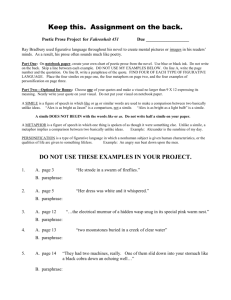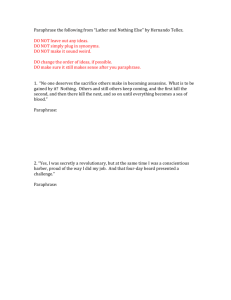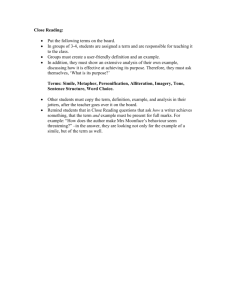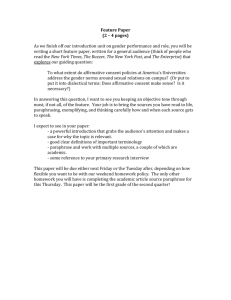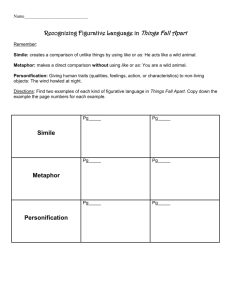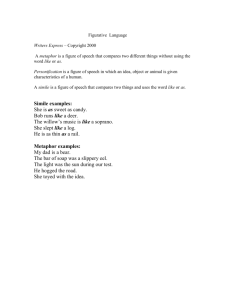Lesson3_text appreciation
advertisement
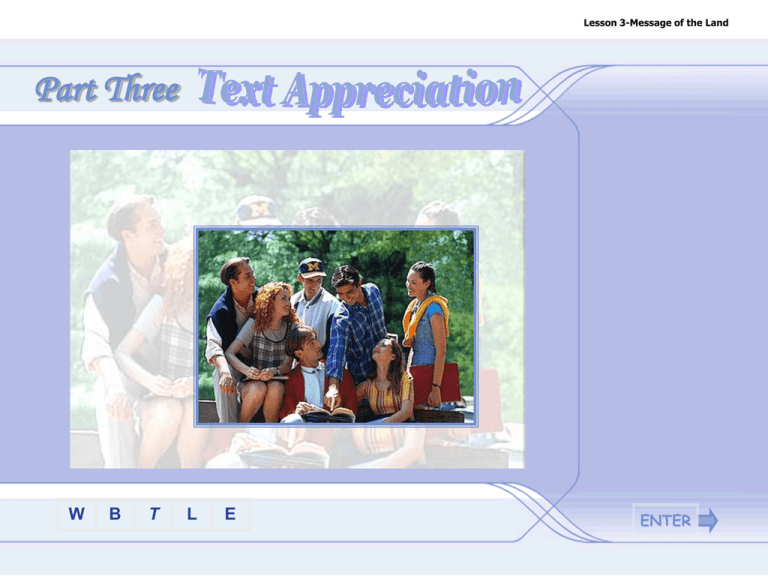
Lesson 3-Message of the Land Part Three W B T L E ENTER Lesson 3-Message of the Land Text Appreciation I. Text Analysis 1. Style 2. Stylistic feature 3. Theme 4. Structure 5. Further discussion II. Writing Devices 1. 2. 3. 4. Simile Metaphor Personification Zeugma III. Sentence Paraphrase W B T L E Lesson 3-Message of the Land I. Text Analysis Style Style: essay (in a very broad sense) or interview The interviewees: a farmer and his wife (note: Since the World War II it has become popular for writers to interview people, record what they say and, after some, not too much, editing, publish these people’s stories in book form.) W B T L E The end of Style. Lesson 3-Message of the Land I. Text Analysis Stylistic feature straightforward language colloquial short sentences small and easy words W B T L E The end of Stylistic feature. Please find supportin g details in the text. Lesson 3-Message of the Land I. Text Analysis Theme of the story The text tells about the deep regret of the old people over the loss of traditional values and the way of life. W B T L E The end of Theme. The theme is hidden in the message of the land. Lesson 3-Message of the Land I. Text Analysis Structure of the text Part I the wife’s speech (paras. 1—3) The wife tells us briefly about her family and how all her children left. (paras. 4—7) This part focuses on the changes that she finds she can’t adjust to. The farmer tells about what he Part II the farmer’s thinks are the root of all evils and what joys he finds in life and speech (paras. 8—11) farming. W B T L E The end of Structure. Lesson 3-Message of the Land I. Text Analysis the loss of traditional values and the way of life Changes in family Changes in the village no barter, but cash no pay-free help plastic things instead only the old on the land no practice of the old customs no respect for the old All four children The wife’s went away. complaints Children wear jeans instead. The farmer’s complaints W B None of the children will come back to inherit the land. T L E • • Greed, anger, and lust are the root of all evils. No young man will care what message the land gives. To be continued on the next page. Lesson 3-Message of the Land I. Text Analysis What’s the message of the land? For further discussion It’s our history, our culture, our tradition and our life. In a word, it is our root which we cannot live without. W B T L E To be continued on the next page. Lesson 3-Message of the Land I. Text Analysis Yes, these are our rice fields. They belonged to my parents and forefathers. The land is more than three centuries old. Question: Why does the wife start conversation with the talk about the land? her The wife has already regarded the land as part of her life. This is the land where her parents and forefathers lived and it is bound with family history and tradition. It represents the root of her family. W B T L E To be continued on the next page. In Para. 1 Lesson 3-Message of the Land I. Text Analysis Question: What’s the main idea of Paras. 1— 3? The wife makes a brief introduction of her family and tells us how all her four children left for cities. She feels sorry about this and she also feels sorry about the land. The land is no longer fertile, like her and her husband, getting old and exhausted. W B T L E To be continued on the next page. Lesson 3-Message of the Land I. Text Analysis Question: What is the topic sentence of Para. 4? What are the supporting details? Topic sentence: “… we two haven’t changed much, but the village has.” Supporting details: • Cash instead of barter • Paid help • Plastic things instead of village crafts • The old alone on the land • Young people’s different way of thinking, dressing and behaving W B T L E To be continued on the next page. Pay attention to paragraph organizatio n. Lesson 3-Message of the Land I. Text Analysis Question: What is the main idea of Paras. 5—6? What is the function of the first sentence in Para. 5? With the first sentence in Para. 5 serving as a transitional sentence, the wife shifts her talk to the things that should not change, which include people’s worship, and young people’s respect to their parents and the aged. W B T L E To be continued on the next page. Lesson 3-Message of the Land I. Text Analysis Question: How does the wife present her speech? What is her attitude toward the changes around her? By comparison/contrast and exemplification, the wife presents her idea of this changing world. She dislikes the changes around her. She won’t accept the changes and even refuses to change with the life. W B T L E To be continued on the next page. Please find examples in the text. Lesson 3-Message of the Land I. Text Analysis Question: What can be inferred from Para. 10? The farmer is very traditional. He still clings to the conventional idea of having a big family with children around him. Because of his strong attachment to the land, he wants his children to follow in his footsteps and be content with the farming life. W B T L E To be continued on the next page. Lesson 3-Message of the Land I. Text Analysis Question: What can we learn from the last paragraph? The farmer nurses a strong love towards the land. He loves the feeling when tilling the land and the smell and sight when the rice on the land is ripening. He feels so close to the land that he can even read the message of the land. He strongly hopes that one day he can pass on the land’s secret message to his grandchildren. W B T L E To be continued on the next page. Lesson 3-Message of the Land I. Text Analysis Question: What are the traits, as shown in the old couple, shared by other farmers? In the couple we find traits that are shared by many farmers who till the land: • love of land and physical labor, and love of family • being honest and kind, and easy to be satisfied • clinging to traditional values and the way of life We can still find the common problems: • generation gap • confusion of the old towards the changing world • young people’s quitting of the farming life W B T L E To be continued on the next page. Further study of the text Lesson 3-Message of the Land I. Text Analysis Further discussion about the text What does the wife think of her husband? How does the husband counterattack his wife’s opinion of him? Does “a pair of jeans” carry any other meanings in the text? How do young girls nowadays differ from those in the old days? Why is the question “Are you happy?” never occurred to her? W B T L E To be continued on the next page. Lesson 3-Message of the Land I. Text Analysis Further discussion about the text What is the wife’s philosophy of life? Why is the farmer at peace with his conditions now? Does the farmer have any regrets? What, in his opinion, is the root of all evils? Do you agree? How does he feel about his wife? Do you think he loves her? Why does he want to leave his land to his children? Why can’t he sell the land and give the money to them? W B T L E The end of Further discussion. Lesson 3-Message of the Land II. Writing Devices Simile Examples A simile consists of two parts: tenor and vehicle. The tenor is the primary subject; the vehicle is the thing to which the main subject is compared to. W B T L E To be continued on the next page. Lesson 3-Message of the Land II. Writing Devices Simile subject / tenor Records (fell) simile marker like reference/ vehicle ripe apples (on a windy day.) The data processing (is going on) as (slow) as a snail. W B T L E The end of Simile. Lesson 3-Message of the Land II. Writing Devices Metaphor A metaphor is also a comparison. The difference is that a simile compares things explicitly—that is, it states literally that X is like Y. A metaphor compares things implicitly. Read literally, it does not state that things are alike; it says that they are the same thing, that they are identical. W B T L E To be continued on the next page. Examples Lesson 3-Message of the Land II. Writing Devices Metaphor subject / tenor reference/ vehicle Cape Cod (is the bared and bended) arm of (Massachusetts.) He (is) a wolf (in sheep’s clothing.) W B T L E To be continued on the next page. Lesson 3-Message of the Land II. Writing Devices Please find the sentences in the text which contain either simile or metaphor and point out the rhetorical device in each sentence. 1. Sometimes, they get bullied and insulted, and it is like a knife piercing my heart. (2) 2. When each of them has a pair of jeans, they are off like birds on the wing. (10) W B T L E To be continued on the next page. Lesson 3-Message of the Land II. Writing Devices 3. The soft cool breeze moves the sheaves, which ripple and shimmer like waves of gold. (11) 4. Yes, this bag of bones dressed in rags can still plant and reap rice from morning till dusk. (7) W B T L E The end of Metaphor. Lesson 3-Message of the Land II. Writing Devices Personification Our piece of land is small, and it is no longer fertile, bleeding year after year and, like us, getting old and exhausted. (3) personification W B T L Referring to inanimate things or abstractions as if they were human. E To be continued on the next page. Personification is really a special kind of metaphor. Lesson 3-Message of the Land II. Writing Devices Personification: more examples As London increased, however, rank and fashion rolled off to the west, and trade, creeping on at their heels took possession of their deserted abodes. The youth were singing, laughing and playing the music instruments. The trees and flowers around them danced heartily as if touched by merry mood. How soon hath Time, the subtle thief of youth, stolen on his wing my three and twentieth year! W B T L E The end of Personification. The purpose of personificatio n is to explain, to expand, and to vivify. Lesson 3-Message of the Land II. Writing Devices Zeugma The soil is not difficult to till when there is a lot of rain, but in a bad year, it’s not only the ploughs that break but our hearts, too. (3) Zeugma: a single word is made to modify or govern two or more words in the same sentence W B T L E To be continued on the next page. Examples Lesson 3-Message of the Land II. Writing Devices Zeugma: more examples 1.The senator picked up his hat as well as his courage. 2. COATTAILS: Clothes that fit the man and the times. (Advert. In New York Times Magazine, 1980) 3. Miss Bolo rose from the table considerably agitated, and went straight home, in a flood of tears and a sedan chair. 4. Ten minutes later, the coffee and Commander Dana of Naval Intelligence arrived simultaneously. W B T L E To be continued on the next page. Lesson 3-Message of the Land II. Writing Devices Zeugma: more examples 5. She had to swallow bread and butter and a spasm of emotion. 6. He fought with desperation and a stout club. 7. Yesterday he had a blue heart and coat. 8. I got up yesterday and managed to catch a bus and a cold. 9. … old people gathering in the social hall for comradeship and a hot lunch. W B T L E The end of Zeugma. Zeugma is a comic figure of speech. At its best Zeugma is witty and amusing, and it increases meaning by revealing hidden connections. Lesson 3-Message of the Land III. Sentence Paraphrase 1 My husband moved into our houses as is the way with us in Esarn. (1) “As” introduces a defining relative clause and functions as its subject, representing what is stated in the main clause. (When we got married) my husband came to live in our house. It was the tradition here in Esarn that the bridegroom should come to live with the bride’s family. go to 2 W B T L E To be continued on the next page. Examples Lesson 3-Message of the Land III. Sentence Paraphrase 1. As is known to all, Taiwan belongs to China. (as—subject of the clause) 2. As is often the case, girls learn a language more quickly than boys. (as—subject of the clause) back to 1 W B T L E Lesson 3-Message of the Land III. Sentence Paraphrase 2 The rest, two boys and two girls, went away as soon as we could afford to buy jeans for them. (1) the remaining people; the others appositive of “the rest” to have enough money to do Our other children—two boys and two girls—left as soon as we had the money to buy them jeans. go to 3 W B T L E To be continued on the next page. Examples Lesson 3-Message of the Land III. Sentence Paraphrase 1. Your father, a proud and unbending man, refused all help that was offered him. 2. Playing football, his only interest in life, brought him many friends. 3. A dry lightning storm, that is, a thunderstorm without rain, started a fire in a remote part of the forest in August. back to 2 W B T L E Lesson 3-Message of the Land III. Sentence Paraphrase 3 It’s easier for my husband. He has ears which don’t hear, a mouth which doesn’t speak, and eyes that don’t see. (2) parallel structure restrictive relative clause News about my children’s problems doesn’t make my husband as sad as me. He doesn’t bother about what is happening around us and to our children. He never says anything about them. go to 4 W B T L E Lesson 3-Message of the Land III. Sentence Paraphrase 4 He has always been patient and silent, minding his own life. (2) present participle phrase functioning as adverbial of accompanying circumstances take care of; attend to He’s always been patient and talks little. He just does his duty and carries on his life. go to 5 W B T L E Lesson 3-Message of the Land III. Sentence Paraphrase 5 Our piece of land is small, and it is no longer fertile, bleeding year after year and, like us, getting old and exhausted. (3) present participle phrases functioning as a cause personification Our land is getting poorer with each passing year, like us who are getting old, weak and tired. go to 6 W B T L E To be continued on the next page. Examples Lesson 3-Message of the Land III. Sentence Paraphrase 1. They sent us their statement, hoping to get our support. 2. They went on with their struggle, thinking theirs was a just cause. 3. Not having received an answer, he decided to write another letter to them. 4. The doctor, not wishing to make her nervous, did not fully explain the seriousness of her condition. back to 5 W B T L E Present participle phrases act as adverbials of cause. Lesson 3-Message of the Land III. Sentence Paraphrase 6 … but in a bad year, it’s not only the ploughs that break but our hearts too. (3) emphatic structure zeugma: “break” governs both “ploughs” and “hearts”. … but when there is a drought, the land is so hard that the ploughs break. And we become very, very sad. go to 7 W B T L E To be continued on the next page. Examples Lesson 3-Message of the Land III. Sentence Paraphrase The emphatic structure “It is/was… that…” can be used to emphasize any part of the sentence except the predicate. 1. It was the policeman that/who caught a pickpocket on No. 933 bus yesterday. (The subject is emphasized.) 1. It was a pickpocket that the policeman caught on No. 933 bus yesterday. (The object is emphasized.) 3. It was on No.933 bus that the policeman caught a pickpocket yesterday. (The adverbial of place is emphasized.) 4. It was yesterday that the policeman caught a pickpocket on No. 933 bus. (The adverbial of time is emphasized.) W B T L E back to 6 Lesson 3-Message of the Land III. Sentence Paraphrase 7 Shops have sprung up, filled with colorful plastic things and goods we have no use for. (4) appear suddenly relative clause past participle phrase functioning as postmodifier to modify “shops” Many shops appear in a short time. In these shops there are lots of colorful plastic things and things that are useless for us. go to 8 W B T L E To be continued on the next page. Examples Lesson 3-Message of the Land III. Sentence Paraphrase 1. The men, soaked with sweat from an allnight march, immediately went into action. 2. The substance, discovered almost by accident, has revolutionized medicine. 3. The book, written in 1957, tells of the struggle of the miners. back to 7 W B T L E A postmodifying past participle phrase corresponds to an elliptical relative clause. Lesson 3-Message of the Land III. Sentence Paraphrase 8 If that kind of thing had happened when I was young, the whole village would have condemned such an ungrateful son, and his father would surely have given him a good beating. (6) scold severely subjunctive mood hit him as a punishment In my day if a boy had screamed at his mother, the whole village would have scolded him for his lack of gratitude, and his father would certainly have punished him. W B T L E go to 9 Lesson 3-Message of the Land III. Sentence Paraphrase 9 Yes, this bag of bones dressed in rags can still plant and reap rice from morning till dusk. (7) very thin metaphor: as thin as a bag of bones past participle phrase functioning as post-modifier It’s true I’m not strong and my clothes are full of holes, but I can still work in the rice fields all day. go to 10 W B T L E Lesson 3-Message of the Land III. Sentence Paraphrase 10 My eyes do see—they see more than they should. My ears do hear—they hear more than is good for me. (8) “do” is used to emphasize verb. “more than is good” is the same as “more than what is good”. I’m not what my wife says I am. I do see and hear—I see and hear too much evil, too many ugly and terrible things, things that I wish I did not have to see and hear. And this is not good for me. go to 11 W B T L E To be continued on the next page. Examples Lesson 3-Message of the Land III. Sentence Paraphrase 1. He drank more than (what) was good for him. 2. Kate meant more than (what) was said. 3. Some of the stories were really more than (what) could be believed. back to 10 W B T L E Lesson 3-Message of the Land III. Sentence Paraphrase 11 It’s good to smell the scent of ripening rice in November. The soft cool breeze moves the sheaves, which ripple and shimmer like waves of gold. (11) simile non-restrictive relative clause gerund functioning as modifier The ripening rice is so pleasant to smell in November. In the soft cool breeze, the sheaves move and shine in the sun like a golden sea. W B T go to 12 L E To be continued on the next page. Examples Lesson 3-Message of the Land III. Sentence Paraphrase 1. They were infuriated by this insulting demand. 2. No soaking rain fell in the period. 3. Our industry is developing at an astonishing speed. back to 11 W B T L E Lesson 3-Message of the Land III. Sentence Paraphrase 12 Yes, I love this land and I hope one of my children comes back one day to live, and gives me grandchildren so that I can pass on the land’s secret message to them. hand or give sth. to sb. Yes, I love this land and I hope one of my children returns one day to live on it, and produces a lot of grandchildren for me so that I can tell them what this land means to us. It is our history, our culture, our tradition, and our life. W B T L E The end of Sentence Paraphrase. Lesson 3-Message of the Land Part Three This is the end of Part Three. Please click HOME to visit other parts. W B T L E
